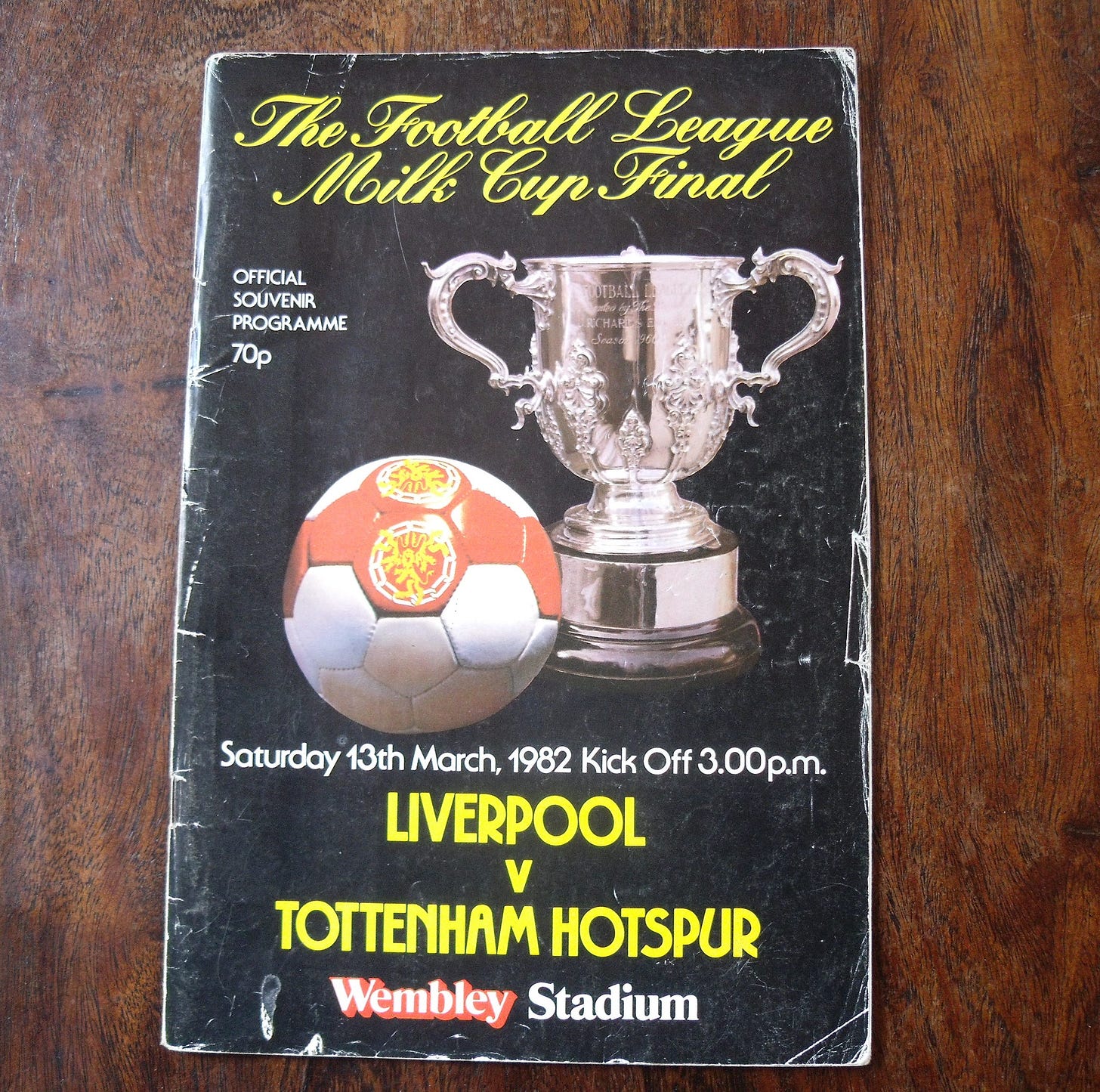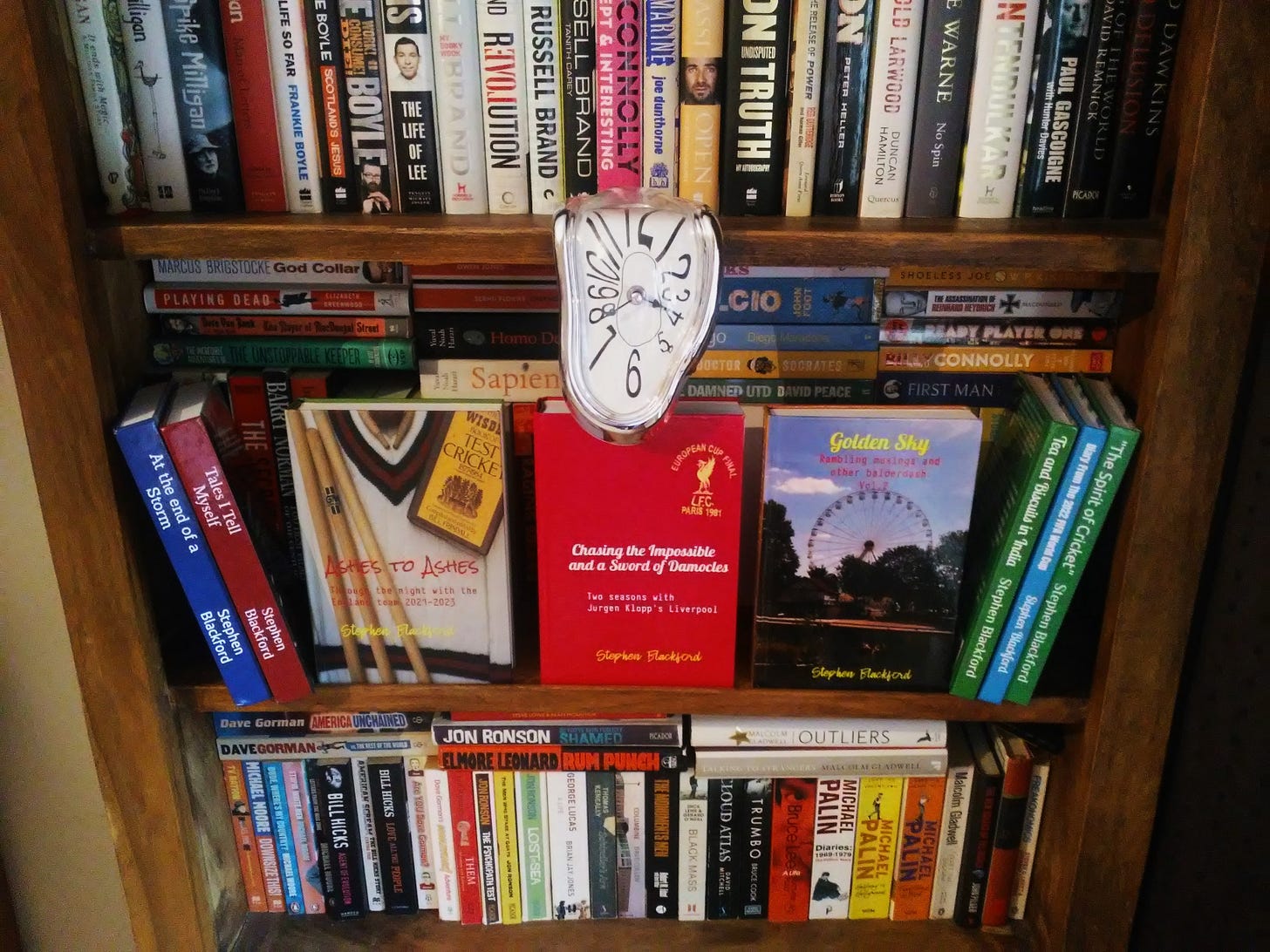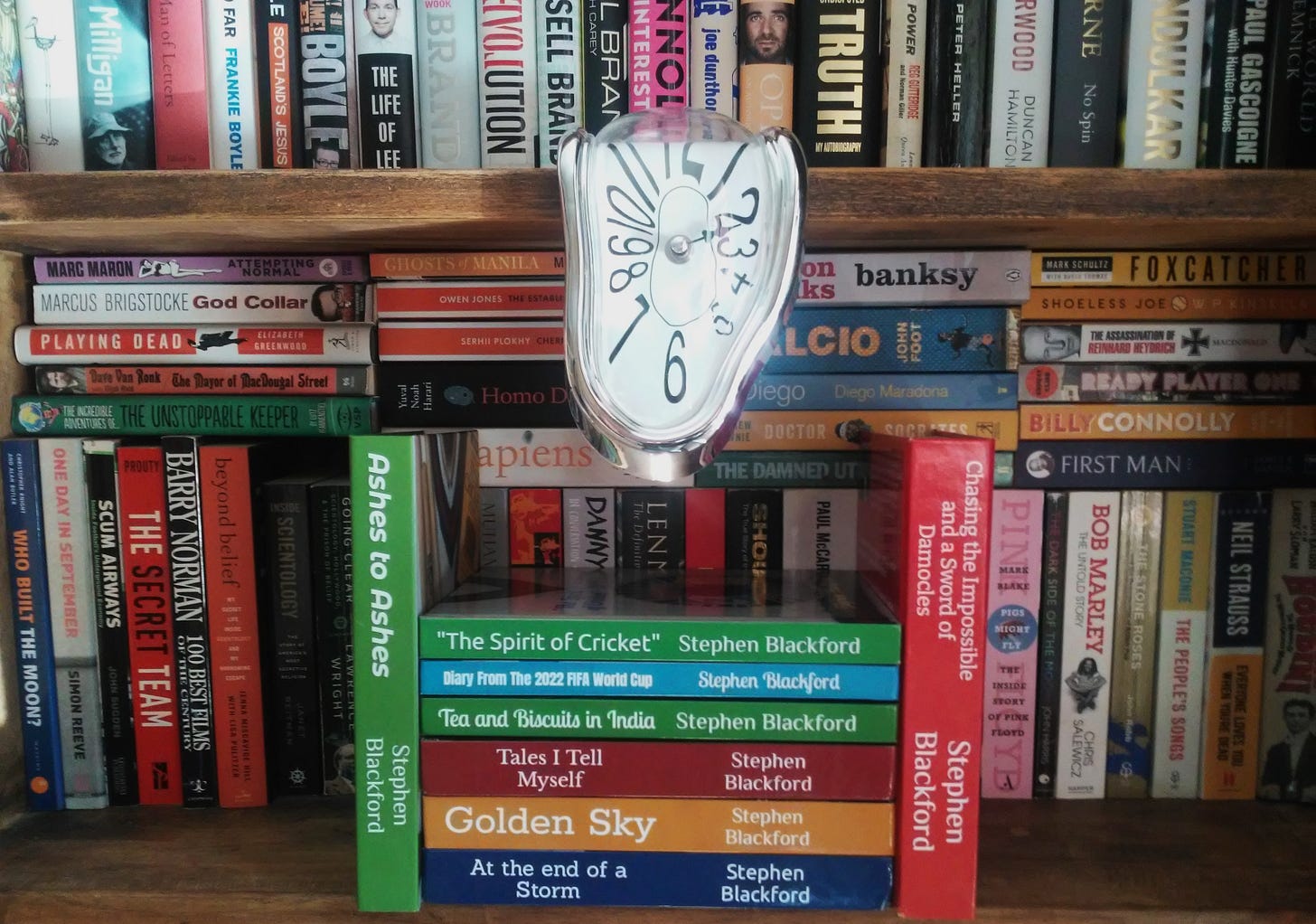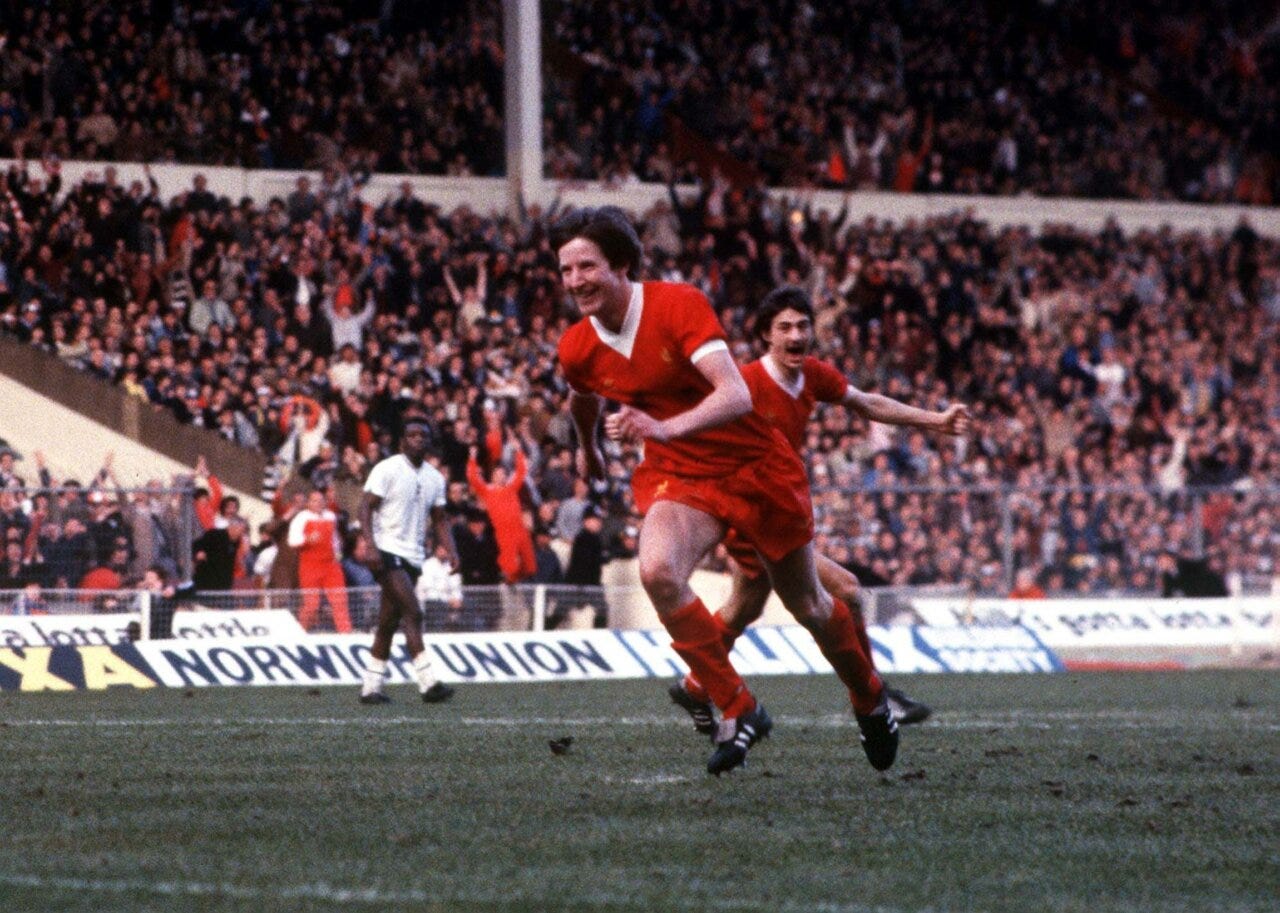
"Wembley is Wonderful for Whelan!" - Youtube
"Wembley is Wonderful for Whelan!" - original article
"Chasing the Impossible and a Sword of Damocles" - available via Amazon
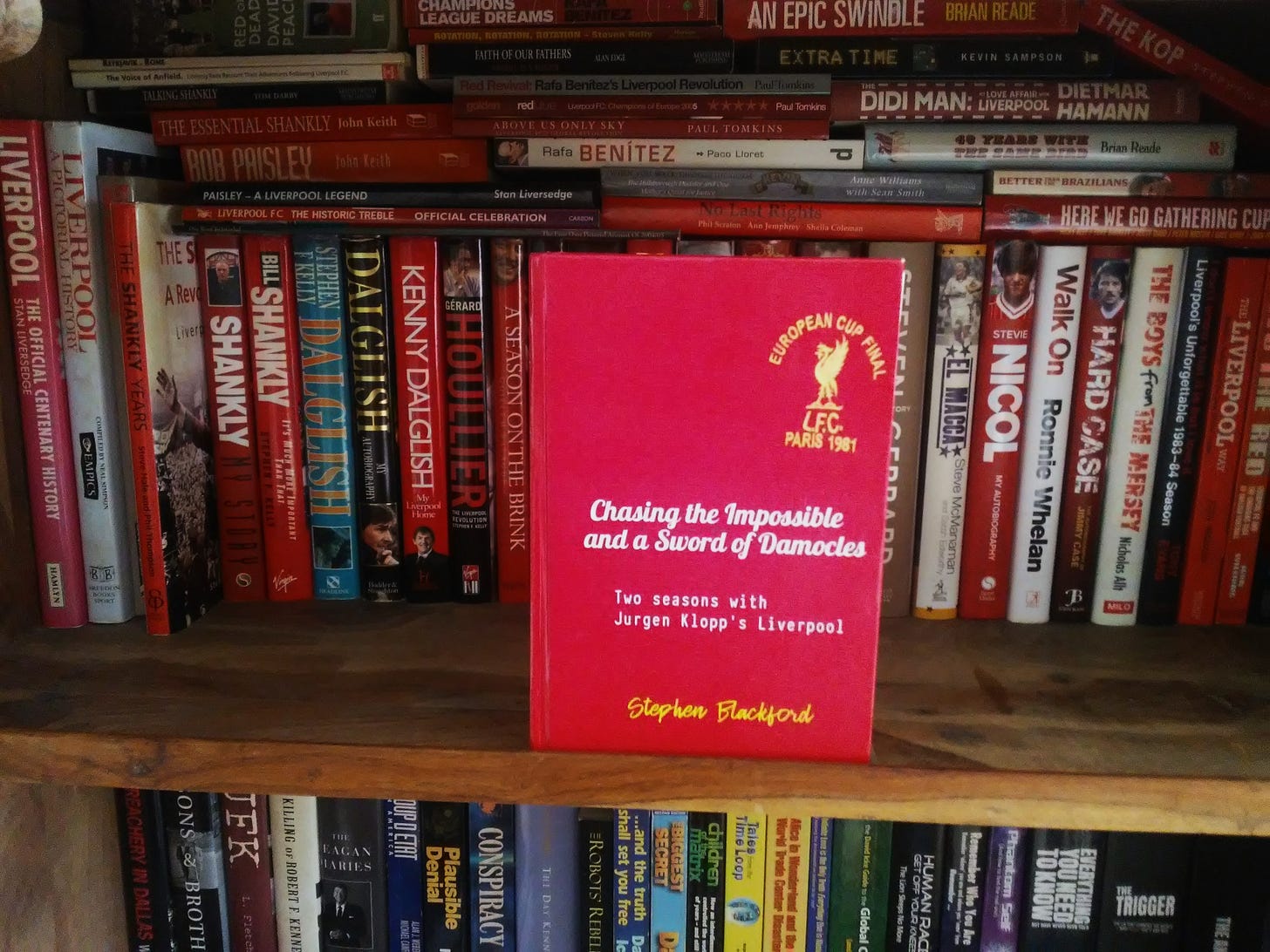
Four decades have now passed since ITV commentator of the day Brian Moore eulogised over the performances of “the two youngsters in this Liverpool side” with the two “youngsters” in question in the very birthing stages of glittering, record breaking careers for the mighty Reds of Liverpool, as well as sharing all three goals on a March afternoon in front of 100,000 at Wembley Stadium that secured a thoroughly deserved 3–1 victory over Tottenham Hotspur that retained their hold on the Football League Cup for a second successive season. That Saturday afternoon of 13th March 1982 was Ronnie Whelan’s first ever appearance at a Wembley Stadium he’d grace with his footballing presence a number of times in his trophy laden future and fellow whippersnapper Ian Rush was in the middle of the first of many incredible record breaking goal scoring seasons for the Reds. Surrounding these fledgling players in a Bob Paisley managed Liverpool team that would only grow stronger as it transitioned in the next season or so an all time great one, was Zimbabwean Bruce Grobbelaar in goal (replacing his counterpart and Liverpool legend Ray Clemence now the custodian of the Tottenham Hotspur goal) as well as a legendary spine of a team that had won all that the English and European game had to offer. Ex captain Phil Thompson returned for the final in place of an injured Alan Hansen but this only reinforced still further an incredible team of the time that contained Phil Neal, Alan Kennedy and Mark Lawrenson in defence, through a midfield of Sammy Lee, Terry McDermott and new skipper Graeme Souness being the guiding light for a young Ronnie Whelan, and “The King” Kenny Dalglish feeding the young and impressionably hungry Ian Rush in attack.
On the other side of the ball, Tottenham Hotspur (more simply just “Spurs”) had never lost at Wembley Stadium and were currently on a run of 25 consecutive cup ties unbeaten in all competitions. Spurs famously won a replayed 1981 FA Cup Final against Manchester City (and would do so again in this years final against Queens Park Rangers in a matter of weeks to retain the FA Cup) and in between defeated Manchester United, Wrexham, Fulham, Nottingham Forest and West Bromwich Albion to continue their unbeaten cup tie streak and reach the 1982 Football League Cup Final. The spine of their FA Cup winning team of just ten months ago in 1981 remained (plus the addition of ex Reds keeper Ray Clemence): captain Steve Perryman organised a tough defence alongside the grizzled warrior that was Graham Roberts, Micky Hazard was breaking into their midfield ala Ronnie Whelan for the Reds and he had the silky skills of Argentinian great Ossie Ardiles and the mercurial Glenn Hoddle surrounding him in a midfield supplying wingers Tony Galvin and Garth Crooks who fed central striker and Scotland International, Steve Archibald.
With the Reds unbeaten in their last 16 games in all competitions and Spurs unbeaten in a cup tie for 25 games, this final had a lot to live up to and it did.
The Reds of Liverpool started the game strongly by penning Spurs in their own half of the field. A sloppy mistake from Spurs defender Paul Miller allowed Ian Rush to steal the ball on the edge of the London team’s penalty area and forcing a corner that Kenny Dalglish floated onto the head of an unmarked Ronnie Whelan who headed narrowly wide of the near post. Tottenham hadn’t started the game at all but when they did, their Scottish International striker Steve Archibald opened the scoring.
GOAL! Liverpool 0 Tottenham Hotspur 1 (Archibald 11 minutes)
“Archibald all the way!”
Described by TV commentator Brian Moore as a “clumsy sort of goal”, there was also a scrappy and clumsy passage of play leading up to Archibald’s brilliantly taken goal. With Spurs first real attack of the game petering out and Mark Lawrenson running the ball with purpose from the edge of his penalty area and away from danger, his pass infield was intercepted by Ossie Ardiles who immediately felt the crunching challenge of a frustrated Lawrenson. With the ball looping uncontrolled and free first Ian Rush failed to bring the ball under control before Spurs captain Steve Perryman could only hook the ball forward hopefully. Enter stage right the somewhat magician of a football Glenn Hoddle who, with a calm lobbed pass forward, split a retreating Liverpool defence and causing panic in the centre that Archibald pounced on. The striker’s first touch was a clever one, deceiving Mark Lawrenson before the Reds defender tried to clear, crashing his clearance against Archibald, aiding him in a way, and as the ball bounced loose and with Grobbelaar racing from his goal line to narrow the angle, Archibald cleverly guided his shot under the advancing goalkeeper and into an empty net.
The remainder of the first half was dominated by Glenn Hoddle pulling the strings for Spurs, Graeme Souness’ will to win urging his side forward, and a sportingly fair battle between the game’s two number 7’s, Argentinian playmaker Ossie Ardiles and Scotland’s Kenny Dalglish. Hoddle would supply Archibald with a half chance after a beautifully curving cross with the outside of his right foot, Souness would leave Tony Galvin writhing in agony after a horrendous two footed challenge that would see an instant red card today and the two number 7’s had a battle all to themselves. Archibald’s half chance header from Hoddle’s sublime cross was the only chance of note for a London team clinging to their 1–0 lead under a weight of constant attacking menace from the Reds. Three attacking Reds moves are worthy of note as the teams approached the half-time break with firstly a back to front move including Phil Thompson, Phil Neal and a brilliant sweeping interplay passing move between Souness and Dalglish that ended with a delicate chip from Dalglish headed powerfully at goal by a diving Sammy Lee, and only a sharp save from Ray Clemence kept his new team in the lead against his old. On the cusp of half-time the Reds would again sweep the entire length of the field, from Thompson and Lawrenson in defence before a sharp cross from Dalglish was headed narrowly wide by a marauding Souness, but the second of the three chances epitomised the half of football. A scrappy and scruffy passage of play was calmed by Dalglish before he tussled, yet again, with Ossie Ardiles. The Scotsman was dispossessed but didn’t give up, winning the ball back before threading a pass through a gaggle of bodies to Ian Rush inside the Spurs 6 yard area. With only Clemence to beat and a bedraggled defence all at sea, Rush missed his kick completely and, despite being by far the better team for the first half of the final, the Reds trooped off 1–0 down.
Following the resumption of the final in the second half the game settled into a free flowing match devoid seemingly of any negative tactics or rigid structure. The first chance of the second half fell the way of Spurs via a huge kick from goalkeeper Ray Clemence which Steve Archibald controlled and retained before passing to Glenn Hoddle and continuing his run forward. From Hoddle’s clever inside pass to Micky Hazard the Reds defence quickly retreated before more clever interchanges and passes between Hazard, Archibald and Garth Crooks resulted in a somewhat tame shot from Hazard that Grobbelaar saved easily. From hereon in it was wave after wave of Liverpool attacks: a long ball from Alan Kennedy was misjudged in error again by Paul Miller. Dalglish’s simple lob forward reached a running in stride Terry McDermott who forced a fine near post save from Clemence in the Spurs goal with a rasping half volley. Next a simple forward ball swept the entire length of the field finding McDermott who passed to Rush before Dalglish took over, beat his defender easily before forcing another fine near post save from his old team mate Ray Clemence before, with the Reds refusing to allow Spurs to get out of their own half, Sammy Lee forced an error from Micky Hazard before Dalglish tamely shot for his old team mate again to save easily.
With only a handful of minutes left and the pressure building on the Spurs goal, a rare attack should’ve seen them, in the footballing vernacular, “kill the game” with a second goal and how they’d rue this huge missed opportunity. Again Glenn Hoddle was at the heart of the action, surging through an empty Reds midfield before forcing a sharp save from Grobbelaar. Unable to hold onto the shot, and with the ball squirming free inside the penalty area, Steve Archibald seemed destined to bookend this final with both an early goal and a late one to seal a Tottenham Hotspur triumph, but with an open goal at his mercy, it was only the brilliant goal line clearance from a retreating Reds captain Graeme Souness that saved the day.
Seconds later, Archibald wouldn’t be the name in the newspaper headlines, and Graeme Souness was about to drag his team up the famed 39 steps of Wembley Stadium as winners.
GOAL! Liverpool 1 Tottenham Hotspur 1 (Whelan 87 minutes)
“Johnson playing it in. WHELAN!”
Just three minutes remained between cup final triumph for Spurs and a last ditch equaliser from the Reds to force extra-time, and Ronnie Whelan was literally central to the final going yet again to that energy sapping period of extra-time. First Dalglish found the eventual goal scorer Whelan in the centre of the pitch before the Irishman fed Ian Rush on the unfamiliar left wing. Rush passed back inside to Whelan still in the centre of the pitch but continuing his run further toward the Spurs goal. Whelan found substitute David Johnson on the right wing as the move crisscrossed the length and width of the Wembley pitch before Johnson’s cross was tame but not resolutely cleared by the Spurs defence. Kenny Dalglish, as usual, didn’t give up on the loose ball, forcing a tepid clearance from Spurs substitute Ricky Villa, and Johnson’s instant return cross was met first time by a still running Ronnie Whelan who gleefully guided the ball into the far bottom corner of the Spurs net. Such Wembley goal scoring joy saw the Irishman, on his first appearance at the famed stadium, skipping and dancing toward the massed ranks of Reds fans behind that goal before being mobbed by his jubilant teammates.
That skipping and leaping joyous celebration from Ronnie Whelan has been burned into my consciousness for four decades now!
At 1–1 and 90 minutes played, the 1982 League Cup Final entered extra-time.
Compared to the historical second, the first period of 15 minutes of extra-time was tame in comparison, with Rush and Dalglish forcing half chances that came to nothing for the Reds and Ricky Villa dragging a good shooting chance wide of Bruce Grobbelaar’s goal. The second period of extra-time started with a fantastic chance for Spurs to retake an improbable lead after superb interplay between Archibald and Ardiles released Garth Crooks to shoot first time and draw a strong near post save from Grobbelaar in the Reds goal. Seconds later, and with Spurs now trying to get out of their own half, a mistake would prove crucial.
GOAL! Liverpool 2 Tottenham Hotspur 1 (Whelan 111 minutes)
“Is this the decisive moment? It’s played to WHELAN!”
A sloppy pass from Ossie Ardiles was easily intercepted by a prowling Ian Rush who’s instant forward pass set Dalglish loose and running through the left side of the Spurs penalty area. He waits, waits, waits before an incisive square pass through the bodies of the Spurs defence finds Whelan again, and his instant control and shot finds the roof of the Spurs net past a helpless Ray Clemence.
Cue his skipping and dancing goal scoring celebration!
Again!
GOAL! Liverpool 3 Tottenham Hotspur 1 (Rush 119 minutes)
“Stopped by Clemence but it’s not away yet. RUSH!”
Eight minutes later and with just a single minute left of the entire final, Spurs were on the attack and deep within the Reds half of the field before a sloppy pass from Ricky Villa beat all of his teammates, but not Sammy Lee. Locally born Lee’s brilliant curling cross field pass with the outside of his right boot transitioned desperate defence into a thrilling counter attack as Rush released substitute David Johnson and although his attempted shot was at first saved by Clemence, he collected the loose ball before calmly passing square to Rush who, from six yards out, tucked the ball between Graham Roberts legs on the goal line and into the Spurs net.
All four goals from this final have been ingrained on my memory since childhood, less so the forty minutes of extended highlights and after match celebrations. Despite being behind for nearly 80 minutes, equalising with just four minutes to go and scoring two in the game’s final fifteen minutes of extra-time, the Reds fully deserved this second consecutive League Cup Final triumph and the second of four successive years of success in this very competition, and the first four of nine total triumphs in this competition following last season’s victory over Chelsea.
“Youngsters” Ronnie Whelan and Ian Rush would be integral to their triumph just twelve months later as Whelan scored the winner in their 2–1 win over their greatest of adversaries, Manchester United, before they both won again a year later (for a fourth League Cup Final win in a row) with a 1–0 win in a replay against their local neighbours, Everton. After an eleven year hiatus without having the three handled trophy in their Anfield cabinet, it would be Ian Rush, now a veteran, who led his Reds team up those famed 39 steps of Wembley as captain in 1995, as the Reds triumphed over Bolton Wanderers to secure their fifth overall League Cup Final win.
Youngsters eh!
Thanks for reading. I hope this message in a bottle in The Matrix finds you well, prospering and the right way up in an upside down world.





